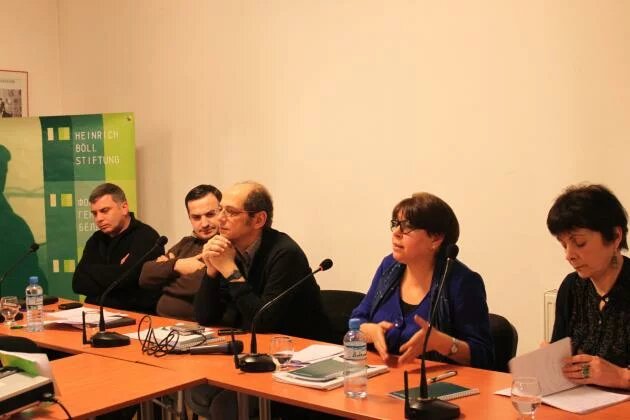
A public debate at the Heinrich Boell Foundation held on 23 March 2011 was devoted to the issue of internally displaced persons (IDPs) in Georgia and their integration within the today’s Georgian society. This critical and sensitive issue of contemporary Georgian social or political life was addressed by Nino Kalandarishvili - Coordinatorm, the IDP NGO Network "Sinergy", Manana Gabashvili - Deputy Country Director, Norwegian Refugee Council Georgia Country Office, Irakli Bokuchava – Chairman, Social Programs Foundation, and Nukri Milorava – Protection Monitoring Program Manager, the Charity Humanitarian Centre “Abkhazeti.” The debate was moderated by Gogi Gvakharia.
Public discourse on the issue of IDP integration in characterized by various attitudes – IDPs themselves often consider integration as a factor hindering return to their homes and are less likely to view this process as a positive change either for them or for a wider societal life. For that reason, there exists diversity of approaches while defining the term “integration.”
Different opinions were expressed within social networks concerning the name of the public debates as well – as the moderator Gogi Gvakharia remarked, “Some people think that this title consists of some arrogance components, as if we gathered here to discuss what to do with the IDPs in Georgia.” But as one of the presenter Manana Gabashvili mentioned later in her speech, integration should be differentiated from assimilation. As she noted, integration process has a positive connotation and unlike assimilation, it implies becoming a part of a greater society while maintaining individual features.
In addition, as Irakli Bokuchava said, on one hand it is also important whether the internally displace persons actually want to integrate within the local population, and on the other hand if the local population is ready for this process.
During the discussion different aspects of social or political rights of the IDPs and legal aspects regulating those rights were underlined. As it is known, until 2003-2004 years, IDPs did not have the right on private property or had limited right to participate in the local self-government elections. According to Irakli Bokuchava, it can be concluded that during that period the state was not ready for creating relevant conditions for supporting integration processes.
Nukri Milorava placed emphases on social and economic problems of IDPs highlighting that persons having IDP status in Georgia did not have problems related to legal-political aspects. Out of social and political sphere he picked several most vital deficiencies that impede the integration process most significantly; those flaws are registration of IDPs on factual dwelling centers, small size living areas, discriminative approach to old IDPs vis-à-vis new IDPs, conditions of alternative housing after forceful evictions implemented through violent means unlike what was written in strategy and the action plan. Nukri Milorava also pointed out that there exists no unified system for the description of collective centers and therefore, IDP families have no information about what will be done to their living centers in the closest future. He also mentioned the problem related to the systemic decentralization of the Ministry of IDPs of Georgia – as he told, the fact that in Zugdidi – the city are there are almost the same amount of IDPs as the local population - there is no local branch of the Ministry that would manage IDP issues. As he stated, it is a very problematic issue that makes clear that the government is not considering the necessity of communication and feedback with IDPs.
The second, interactive part of the debates was tense, but lively – the majority of the attending audience were internally displaces persons and therefore questions raised by them were actually reflecting problems facing to those people.
Full text of the debate in Georgian (pdf, 214 KB)